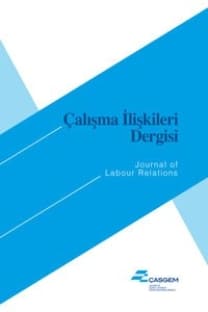Avrupa Birliği’nde Krizin İşsizliğe Etkisi ve İstihdam Teşvikleri
Sosyal devlet, güçsüz geniş kesimlerin dezavantajlı konumlarının bertaraf edilmesinde aktif politikalar geliştirmek durumundadır. Yoksulluk ve yoksunluğun olumsuz etkilerinin en şiddetli tesir ettiği kitleler arasında şüphesiz işsizler yer almaktadır. Modern dünyanın en ciddi iktisadi sorunları arasında yer alan küresel krizlerin, dezavantajlı kitleler arasındaki tezahürü de işsizlikle şiddetini göstermektedir. Doğal olarak da sosyal devletin bu sorunun çözümüne yönelik aktif istihdam politikaları uygulaması zorunluluk haline gelmektedir. Küresel ekonomik kriz tüm ülkelerin emek piyasalarını olumsuz etkilemektedir. Bu kriz karşısında Avrupa Birliği üyesi ülkeler de kurumsal ve ülke bazında imkânları harekete geçirerek işsizliği azaltıcı politikaları hayata geçirmektedirler. Bu çalışmada da Almanya’nın, Fransa’nın, İtalya’nın ve Yunanistan’ın işsizliği azaltıcı yönde uygulamaya geçirdikleri politikalar değerlendirilmektedir.
Anahtar Kelimeler:
Aktif istihdam politikaları, Avrupa Birliği, küresel kriz, işsizlik, istihdam
The Effect of the Crisis on Unemployment in the European Union and Employment Incentives
Welfare state has to develop active policies in order to eliminate disadvantageous position of large powerless groups, like the body of unemployed persons, in the society. In general, unemployed persons feel very strongly the negative effects of poverty. Global crises, which are the one of the most serious economic problems in the modern world, aggravate the situation of disadvantageous groups especially by increasing the numbers of unemployed persons. Consequently, welfare state, by definition, must develop some active employment policies in order to decrease unemployment. The global economic crisis has negative effects on the labour markets in all countries. The member countries of the European Union have been taking some measurements to eliminate these negative effects in order to decrease the number of unemployed people. This study evaluates the policies put into action to decrease unemployment in Germany, France, Italy and Greece.
Keywords:
Active employment policies, European Union, global crisis, unemployment, employment,
- ISSN: 2146-0000
- Yayın Aralığı: Yılda 2 Sayı
- Başlangıç: 2010
- Yayıncı: Çalışma ve Sosyal Güvenlik Eğitim ve Araştırma Merkezi
Sayıdaki Diğer Makaleler
Ev Hizmetlerinde Çalışan Kadınlar ya da Evlerin Kadınları
Fatma FİDAN, M. Çağlar ÖZDEMİR
İşsizliğin Psikolojik Sonuçları: Antalya Örneği
Rabia Bato Çizel, Cem Oktay Güzeller, Nergis Mütevellioğlu
Avrupa Birliği’nde Krizin İşsizliğe Etkisi ve İstihdam Teşvikleri
İstihdamın Arttırılmasında Girişimciliğin Önemi: Girişimcilik Destekleme Modeli Olarak İŞGEM’LER
Yıldırma ve Yönetim Becerileri Üzerine Bir Araştırma
Sosyal Güvenlik ve Aile Yardımı Uygulamaları
